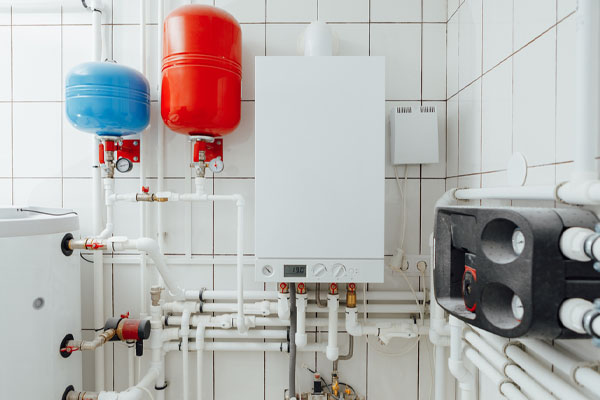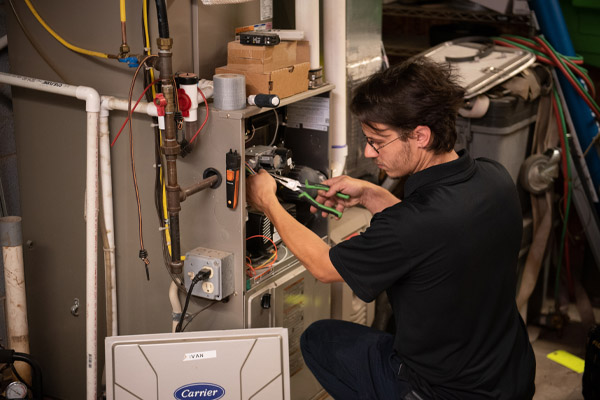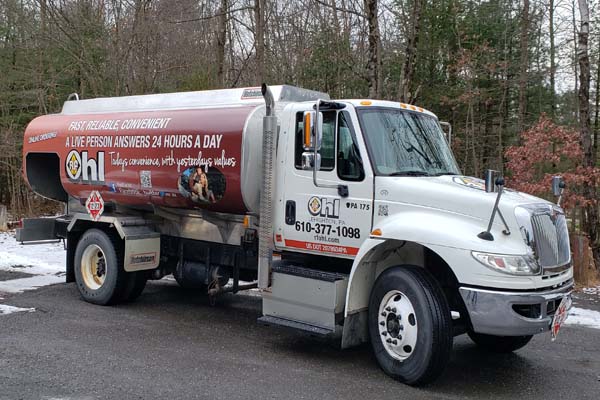
Home oil-fired heaters have always mystified many homeowners. While they understand the need to store heating oil in their tank, they may not know how the system operates. This article discusses how an oil heating system works. We share some common heating oil myths, as well as some important aspects of proper oil heating system maintenance. Keep reading to explore how your heating oil system works.
How Your Heating Oil System Works
There are three ways for a heating oil system to warm your home: radiators, baseboards, and vents. Its operation starts with the thermostat. The thermostat of your heating system senses the ambient temperature. The thermostat signals the heater to begin warming your home when it plunges a specific temperature.
Oil travels from the tank to the burner via a pump when it heats. The oil then becomes a warm mist that mixes with the air. The air and fuel mixture travels into the burner, creating fire in the combustion chamber.
The heating oil heats the water or air that heats your home, per the type of heating system installed in your home.
Two Types of Heating Oil Systems
There are two kinds of heating oil systems you can choose from. They are a boiler and a furnace. The two have key differences, but one feature they have in common is that newer models run more efficiently.
Furnace

Newer minimum-efficiency furnaces have better and more efficient operations than older atmospheric furnaces. A fan forces the exhaust air via a heat exchanger.
The newer condensing furnaces are the best ones when it comes to oil-powered furnaces. These furnaces mean that less heat escapes outside. They also cool gasses first instead of releasing the hot exhaust immediately. Therefore, water vapor condenses, and a plastic pipe on the side releases exhaust.
Boiler
Hydronic boilers warm water, and the hot water travels around the house, heating everything through baseboards or radiators. The cooled liquid then returns to the boiler for reheating.
There is also the steam boiler, which is a less common type of heating oil system. It works by boiling water and letting the steam move through the system. It heats your home through radiators.
A furnace differs from a boiler in that the former uses air for home heating, while boilers use water. They undergo a similar process wherein the heated oil keeps the system warm, allowing the cold air or cold water to go through a reheating cycle.
The Advantages Of Heating Oil
Heating oil produces the hottest flame among all the home heating forms. It burns 400 degrees hotter than natural gas or propane. Therefore, you can have many benefits when you use heating oil in your home. An example is that your home will heat faster using less fuel. It will also be easier to maintain your preferred temperatures more efficiently while providing a more comfortable atmosphere.
Equipment efficiency is the most crucial factor you need to consider when making a home heating decision. The standard efficiency ratings for the newest models of heating oil systems are 80% and above. Newer oil heating systems feature new designs and technological improvements that allow them to continue boosting their efficiency ratings.
The design of oil heating systems makes them more economical to run than other energy forms like electricity. Therefore, it will be less costly to heat your home.
The heated oil is non-toxic, completely biodegradable, and contains no carcinogens. A well-maintained oil tank can serve your home for several decades. Moreover, residential oil tanks do not harm the environment and your health. This heating method has the least environmental impact because it has high efficiency and a clean burn.
Common Myths About Oil Heating
Some of the common myths regarding oil heating include:
- Many think oil heating has worse environmental effects than other heating systems. However, this is false. New technology has resulted in fuel oil having cleaner burns, making it one of the best heating systems for the environment.
- Heating oil systems cost less and have a longer lifespan than other heating systems, so they are worthy investments. An oil heater can help you save 5% of your fuel.
- Heating oil units have a service life of around 30 years longer than natural gas or propane, which typically last about 11 to 14 years.
- A common misconception is that heating oil isn’t safe. This is entirely untrue because it is very safe in its natural state, like diesel fuel. When stored correctly, heating oil doesn’t pose a threat to an explosion or is a cause for concern.
Oil Heating System Maintenance

Like other heaters, oil heating systems need proper maintenance so that you are sure that all components work correctly and efficiently. You can conduct basic maintenance tasks such as cleaning your thermostat before the heating season begins, which helps your home’s temperature regulation.
Your oil heating system’s blower and stack parts also need upkeep because they monitor the burner. This helps remove debris that can slow down the heater’s functionality.
It is always best to contact your local, trusted technician to help you ensure that your heating system is working as it should before the winter starts. Check the HVAC services R.F. Ohl offers today, such as our furnace service, which includes the annual cleaning your heating system needs.
Conclusion
Oil heat now provides more than just efficient heating, thanks to recent technological advances. The latest oil systems can also provide cooling benefits. They can supply your home with hot water throughout the day while heating your swimming pool and bathtubs. You can rest assured that you can get much more when you install the latest systems in your home.
Call R.F. Ohl For Fast & Affordable Heating Oil Deliveries

R.F. Ohl is a reliable HVAC company and heating oil supplier. We offer the most competitive heating oil prices in the region, and our deliveries are always completed in a timely and efficient manner. We offer many different delivery plans and financing options so that you can customize your heating oil deliveries to fit your needs. In addition, we employ only experienced, licensed HVAC technicians to complete any necessary heating tune-ups and repairs so that you can reduce your overall energy costs.
At R.F. Ohl, we provide state-of-the-art HVAC repairs, replacements, tune-ups, and installations. Our professionals have the knowledge and experience to offer you practical and reasonably priced solutions for all your home comfort needs.
Contact R.F. Ohl as soon as possible, and we will be happy to schedule a complimentary, in-home estimate of your HVAC system. Likewise, call us today to find out more about our fuel deliveries.
Click here to contact us today or give us a call at (610) 377-1098 if you have any questions.
The post How Your Heating Oil System Works appeared first on R.F. Ohl.
No comments:
Post a Comment